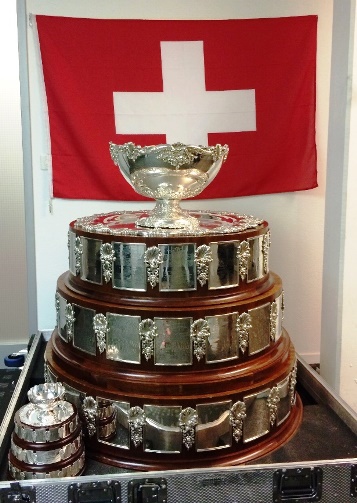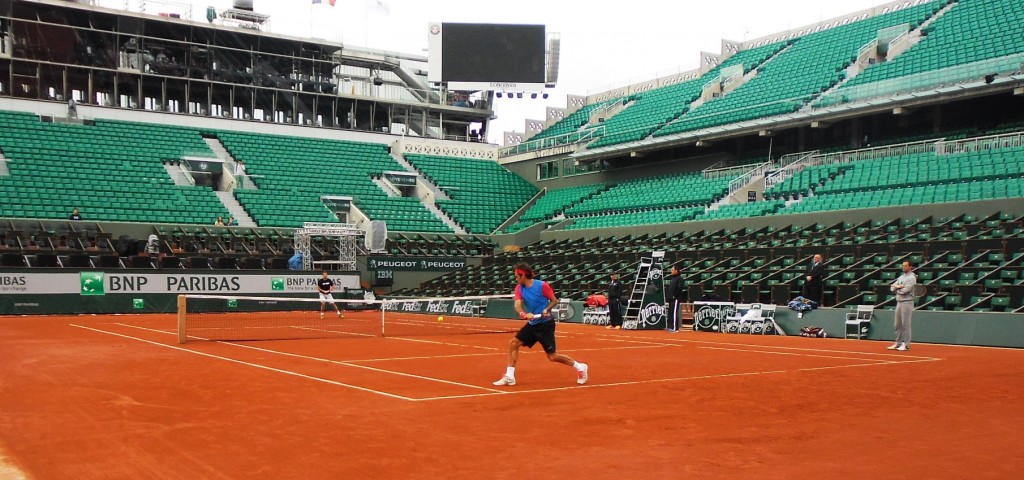Recently, the issue of “tennis parenting,” a term used loosely to represent everything that involves the dynamics of how parents handle their relationship with their kid who chooses to play competitive tennis, has resurfaced within the last month. During an ITF tournament in Israel, witnesses by the court side saw sixteen-year-old player Andrada Surdeanu crying with blood streaming down her nose after her father Lucian slapped her following a loss in the quarterfinals. As if that was not disturbing enough, both Surdeanu and her mother Ioana came to the father’s defense. Andrada said that it was normal for her father to punish her and that she “deserved” it. Ioana claimed that Lucian was unjustly mistreated by the Israeli police following the incident, while barely recognizing her husband’s excessive act.
Meanwhile, in France the film 40-Love (Terre Battue in French which actually means ‘Clay Court’) was released across theaters two weeks ago, inspired from the real-life story of a father, back in the early 2000s, who would secretly add a drug causing drowsiness into the water of his children’s opponents in order to give his children an advantage against their opponents. When one of the opponents ended up dying as the result of one such attempt, the scheme was uncovered and the father headed to jail.
On a different note, Roger Federer spoke to BBC few days ago about the ins and outs of parenting children who play competitive tennis, and vowed that he would never be a “pushy” parent if his kids decided to play competitive tennis. Federer emphasized that youngsters need space from their parents, and spend time alone with their coaches whether in practice or in tournaments. His insight was valuable in that he underlined the distinction between supportive and pushy parents, certainly drawing from his experience with his own parents.
I agree with Federer – and my own experience back in my times as a young tennis player confirms this – that parents need not necessarily travel to every tournament and constantly be around the coach and the kid. At the same time, I must add that this is ideal only if the parents do not have a tennis background and do not therefore understand the game as well as the coach, or even the kid. On the one hand, many parents in this category do a wonderful job of being there for their kid when needed, but know that their role is to provide emotional support and not to get excessively involved in tennis-related discussions that should be left to the coach. On the other hand, a number of parents also suffer from a variation of the “Dunning-Kruger effect” and turn the experience of competition into a miserable one for their kid.
It is important to pinpoint one area that I feel is not adequately represented in the discussions involving tennis parents. Parents that suffer from this problem (often without realizing that they do) need to be told in plain and simple words that for the duration of a practice session, or a match, they are not the parents in the traditional role. Let’s detail why parents are unable to resist the temptation of sticking their nose where it does not belong.
Take for example the parents of an 11-year-old kid who is playing competitive tennis. Throughout their kid’s life up to that point, parents have made every single decision for their kid, when to eat, what to eat, when to study, when to go to sleep, when to go to the movies, etc. They have gotten addicted to that control, and the kid has gotten addicted to the comfort of knowing that, without both realizing that they have gotten used to that pattern. Now, comes the abrupt intrusion of an hour-long practice session, or of a match, and shatters that pattern and its related world of addiction.
As a result, the parents feel an unexpected loss of power. They can’t quite get their hands on the matter (the game of tennis), and yet, they watch their kids emotionally suffer or get upset during a period of bad play. Imagine the frustration of the inability to reconcile their unknowingly over-developed ‘control-freak side’ when it comes to every detail concerning their child, with the helplessness that they feel at not being able to do anything about it when their kid is experiencing problems. They have been able to “make it go away” in the past for 11 years, and now all of a sudden, they can’t perform what they perceive to be their usual duty.
That is the shifting point where the dynamics between tennis parents and their kid’s tennis experience can go sour in a hurry. They can understand and accept their limitations, consider that shifting point as their own “growing pain,” and deal with the change properly. Or, they can give in to their addiction, their control freak side that has furtively been reinforced over the years, and begin to cause friction by imposing their own unwelcomed intrusion into their kid’s tennis-related domain. Unfortunately, parents are not sufficiently made aware of the inevitable arrival of this specific moment that I referred to as the “shifting point” above. Believe it or not, what may seem crystal clear to the person who reads this, remains a mystery to most tennis parents who do not have a tennis background. My advice to the coach, or to anyone who is a close friend of such tennis parents, is that they make the parents aware of the tension that this shift will cause at arrival. Explain the process in detail, moment by moment! Believe me, they will need to hear it, probably more than once! Your explanation must be so clear that they must be able to immediately recognize that moment when it rears its head, and they begin to sense the feeling of frustration as a result, announcing the eminent arrival of the shifting point.
It is worthy to note that this moment will occur with every tennis parent, whether they are good ones or bad ones. Parents take care of their kids, help them in any way they can, and guide them in every aspect of their lives as they grow into their teenage years. The inner conflict created by the shifting point does not define their parenthood, nor does it label them as good or bad parents. However, the way they deal with that temporary loss of control that they previously took for granted, will in turn have an impact on their children’s tennis experience, and possibly leave long-term traces on their future perception of the sport. Also keep in mind that this article focused on parents that do not have a tennis background and do not have extensive knowledge of the game at a competitive level. As to what happens if they did, it is for another article in the future.


